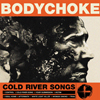Bodychoke, "Cold River Songs"
 Originally released a bit over ten years ago, this third (and final) album from the Sutcliffe Jugend side project had always been one of the lost masterpieces, as far I was concerned. It was the most fully realized work of dark, anger fueled hate rock that the band put out, and ranks up there with the best work of somewhat similar bands like Swans, Godflesh, and Big Black. Time has been kind to the disc, which sounds just as powerful and forceful today as it was upon release, and now it is much more widely available.
Originally released a bit over ten years ago, this third (and final) album from the Sutcliffe Jugend side project had always been one of the lost masterpieces, as far I was concerned. It was the most fully realized work of dark, anger fueled hate rock that the band put out, and ranks up there with the best work of somewhat similar bands like Swans, Godflesh, and Big Black. Time has been kind to the disc, which sounds just as powerful and forceful today as it was upon release, and now it is much more widely available.
Long before starting with Brainwashed, I used to run a personal site that did music reviews, which transitioned to a short-lived webzine. After my review of the first album, Mindshaft, bassist Gary Kean sent me a copy of this album upon release, which was on his Purity label. By far, I received more comments and emails about this disc than anything else I reviewed at the time, mostly asking where I got the album. Finally, Relapse has reissued it with three extra tracks, which are culled from the Completion disc of demos and unreleased tracks.
Bodychoke’s previous albums were great, but still somewhat flawed: Mindshaft was too tentative, and Five Prostitutes was too sprawling and uneven. Cold River Songs, on the other hand, was a fully realized album that incorporated many different elements, yet felt like a cohesive work. The first two tracks alone exemplify this: "Control" opens with a barrage of pure, raw guitar noise that wasn't far removed from the contemporaneous Sutcliffe Jugend work, which segued into cello, then pummeling drums, and screamed vocals from Kevin Tomkins.
The next track, "Cold River Song," is a much longer ten minute piece that opens with some gentle guitar before the drums kick in, the track remaining a contrast of clean guitar and cello, but at the same time blown out noise bass and guitar. Structurally it builds in tension, the calm vocals throughout most of the verses are punctuated with the screamed choruses. It all builds to a crescendo that is first eerily calm, and then unhinged and violent, before closing beautifully.
"Your Submission" is another track that emphasizes this duality: it focuses initially on cello, unconventional guitar sounds over a quiet rhythm and the calmer vocals of Paul Taylor before the track explodes into screams, rapid fire drums, and pure guitar noise. The chaos carries over into "Victim," which has a cello lead over guitar squall and tribal drumming.
The penultimate track (on the original album) "Ideal Home" is perhaps the most significant departure here. Not only does it remain a slow, reserved track driven by cello and bass, but also represents the most drastic differences lyrically. Most of the album is thematically linked to general themes of misogyny and murder of the libertinage sort, but rather than similar bands (noise or otherwise) singular focus, here it is the insecurities and weaknesses of the fictional criminal(s) that are the topic. Original album closer "Aftermath" is another dramatic, mostly instrumental piece that meshes careful restraint with dissonant squall to great effect, but remains second to the 16 minute feedback behemoth "The Red Sea," that closed Five Prostitutes.
The three bonus tracks here are obviously drawn from the same sessions and would have not been out of place on the original release. "White Light Killer" is a rapid-fire rhythm track lead by distorted bass that blows out into raw noise at the choruses, structurally and conceptually similar to "Control," but it still stands on its own. The level of polish on this demo makes me think it may have been intended for the rumored album on American Recordings (yes, Rick Rubin's label) that was never finished, and the band disintegrated. "Woman Unkind" is a contrast between extremely sparse instrumentation and quiet vocals and sheets of jagged noise guitar, and its thin lo-fi production is a strength rather than a weakness. "Trial" feels like a companion piece to "Victim," its early Killing Joke like drums, distorted bass, and cello mixed with Paul Taylor's screaming vocals.
While the disc is purported to be remastered, I am skeptical. Not that this is necessarily a bad thing, because the original issue sounded, and still sounds great. The bonus tracks have a general roughness to them, which is not surprising given they were originally demos. Relapse's presentation, however, leaves something to be desired. The inclusion of the full lyrics is a definite bonus, and it is always reassuring to know that my interpretation of the words wasn't too far off, but the art design smacks too much of trying to market it as "metal" and “extreme." The faux crime scene black and white photography and bold, block fonts aren't as pleasing as the original pressing's black and white cover painting and sparse layout.
It's nitpicky, but my love for this album would no doubt lead me to pick out flaws. For the average person, none of this will matter, because the music is the most important element, and that is entirely spot-on. The more important thing is that this album is once again seeing the light of day, and hopefully it will not remain as unknown and unappreciated for the next ten years.
samples:



